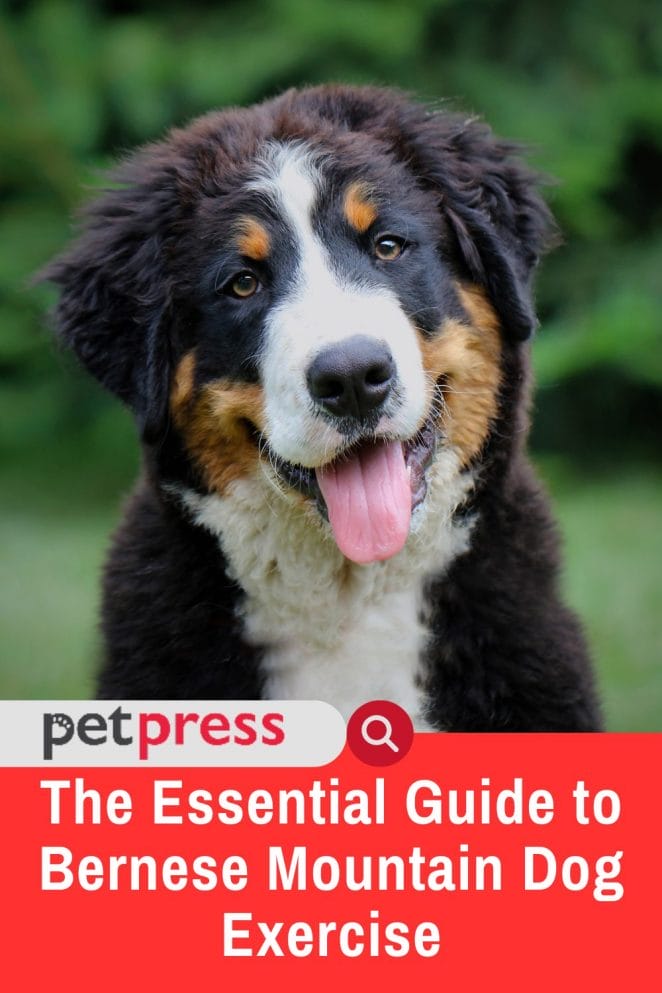
Are you the proud owner of a Bernese Mountain Dog or considering adopting this beautiful breed? Your playful, intelligent companion requires consistent exercise to stay healthy and happy. This post will help you understand the importance and specifics of the Bernese Mountain dog exercise.
Understanding the Bernese Mountain Dog
Bernese Mountain dogs, fondly known as “Berners,” originate from the Swiss Alps. They’re large, muscular, and built for hard work. Despite their size, they’re known for their gentle demeanor and deep affection for their family.
Hailing from Switzerland, they are a large and sturdy breed with a friendly personality and a gentle spirit. Apart from their recognizable tri-color coat and their love for cold weather, there is much more to know about these remarkable creatures.
- A Swiss heritage Bernese Mountain Dogs originate from the canton of Bern in Switzerland, hence the name. They were bred to be farm dogs and were used for pulling carts, herding livestock, and serving as wonderful companions.
- Their tri-color coat is more than just cute. Berners are well-known for their beautiful, silky tri-color coat. This coat isn’t just for appearance; it also serves a purpose. It was designed to shield them from the cold weather in the Swiss Alps.
- They are part of the ‘Sennenhund‘ family. Bernese Mountain Dogs belong to a family of dogs called Sennenhunds, also known as Swiss Mountain Dogs. This dog family consists of four breeds, all known for their distinctive tri-color appearance and large size.
- Berners are one of the most affectionate breeds. While they might be big, their hearts are even bigger. Berners are known for their gentle and affectionate nature. They are very loyal and tend to form strong bonds with their families.
- They are versatile workers. Bernese Mountain Dogs are born workers. In addition to their historical duties, they excel in activities like tracking, herding, and even search and rescue missions.
- They mature slowly. Berners remain ‘puppies’ for a longer period compared to other breeds. They take around 2–3 years to mature, and during this time, they retain their delightful, playful puppy energy.
- They are great with kids and other pets. Bernese Mountain Dogs are very patient and gentle, making them great companions for families with children. They also mingle well with other pets.
- They love the cold. Berners are cold-weather lovers. Their thick coat makes them more suited to cooler climates, and they thoroughly enjoy playing in the snow.
- They have a short life span. Sadly, Bernese Mountain Dogs have a shorter lifespan compared to other breeds, usually ranging from 6–8 years. They are prone to health issues like hip dysplasia and certain types of cancer. Regular vet check-ups and a healthy lifestyle can help prolong their lives.
- They are quick learners. Berners are intelligent dogs that love to please their owners, which makes them fairly easy to train. They respond well to positive reinforcement techniques.
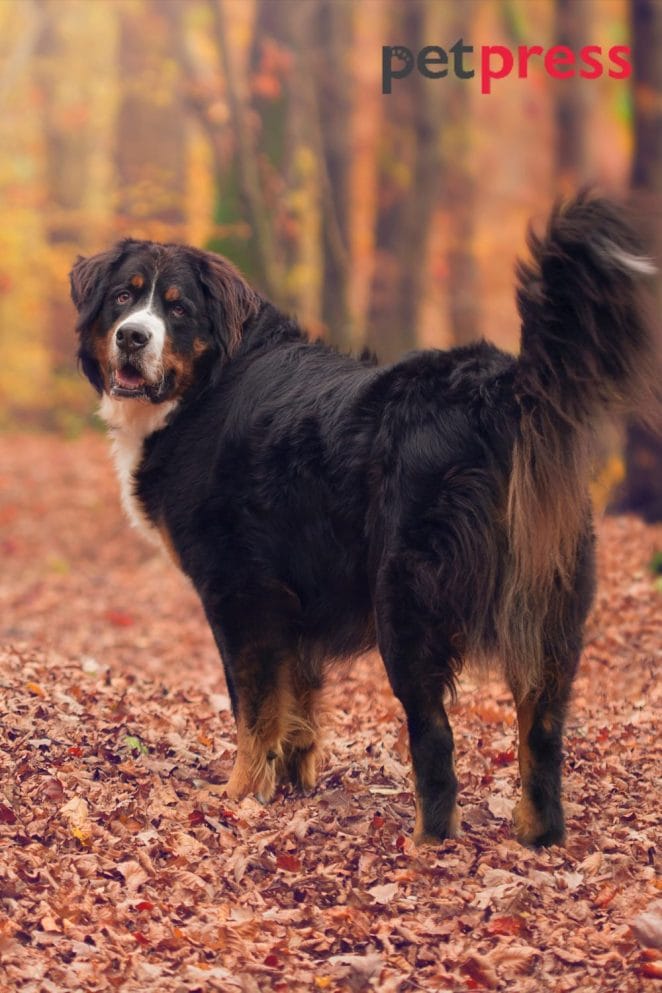
Why Exercise Matters For Berners
Berners are an active breed; they are designed for strenuous work like herding cattle or pulling carts. Regular physical activity is essential for their overall health and well-being. It helps them:
- Maintain a healthy weight
- Keep their heart and lungs healthy
- Improve joint health
- Reduce behavior issues like destructive chewing
The Ideal Bernese Mountain Dog Exercise Routine
Bernese Mountain Dogs are loving, energetic companions that thrive on interaction and exercise. Coming up with an enjoyable, effective exercise routine for your Berner not only helps them stay physically fit but also mentally stimulated.
Here, we delve deeper into the framework of an ideal exercise routine for your Bernese Mountain Dog.
Daily Walks: A Fundamental Component
Regular walks are the foundation of any dog exercise routine, and it’s no different for Bernese Mountain Dogs. Owing to their active nature and significant energy levels, experts recommend two walks per day, each around an hour long.
Berners get to sniff around, familiarize themselves with different environments, and meet other dogs. It’s a comprehensive activity that caters to your dog’s primal instincts, physical needs, and socialization requirements.

Interactive Games: Fitness and Fun
Interactive games are an excellent way to inject fun into your Berner’s exercise regime. Games like fetch, hide and seek, or tug-of-war offer both physical and mental stimulation. They not only help your Berner burn calories but also stimulate their minds by presenting them with tasks to solve.
For instance, a game of fetch involves running and retrieving, which is a good workout. Hide and seek, on the other hand, combines physical activity with the challenge of finding a hidden object or person, keeping the dog mentally alert and engaged.
Strength Training: More Than Just a Workout
Bernese Mountain Dogs were initially bred for work, specifically to pull carts and herd cattle. Even though they no longer need to perform these tasks, the instinct remains.
Incorporating strength training into your Berner’s exercise routine can engage these instincts and provide a sense of purpose. Tasks could include pulling a small cart or carrying a backpack during walks. This not only builds and maintains muscle mass but also improves overall health and well-being.
Do remember, however, that any form of strength training should only be introduced once your Berner is fully grown, and even then, only after consultation with a veterinarian.
Agility Training: Beneficial for Both Body and Mind
Berners are remarkably intelligent, quick to learn, and eager to please – the perfect combination for agility training. This involves them navigating through an obstacle course guided by their owner’s commands.
Agility training can be an excellent way to keep your Berner physically fit while also stimulating their mind. It strengthens the owner-dog bond, improves obedience, boosts confidence, and is also just plain fun.
However, due to the Berners’ size and susceptibility to hip and elbow dysplasia, it’s crucial to approach agility training with caution. Consult with a veterinarian or a professional dog trainer before you begin.
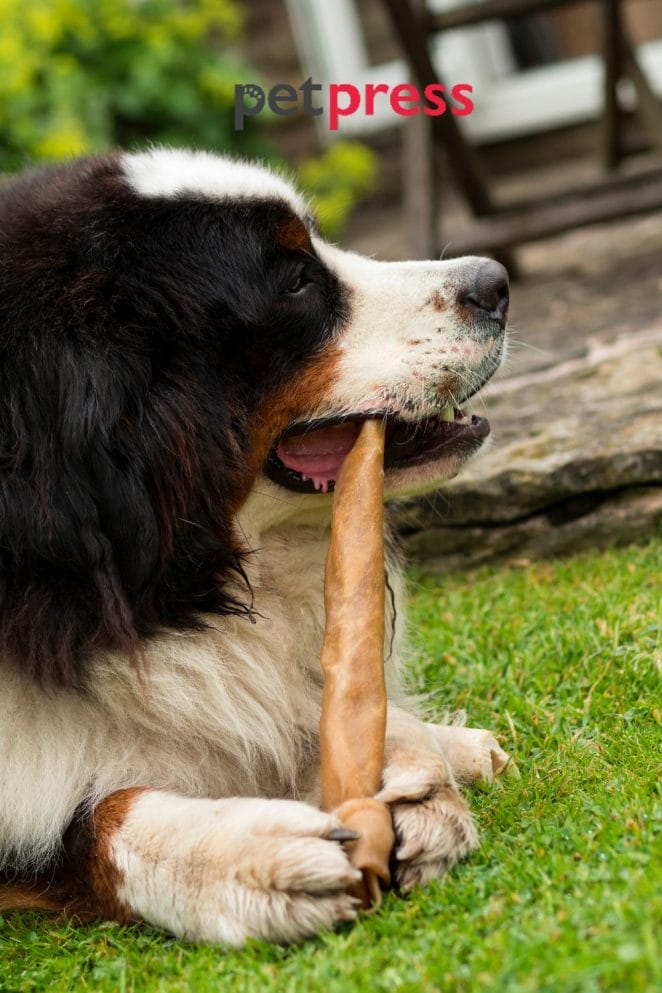
How Much Exercise Does a Bernese Mountain Dog Need?
Puppy, adult, or senior? The age of your Berner largely determines your exercise needs.
Puppies
Over-exercising a Berner pup can harm their developing joints. Limit their physical activity to 5 minutes for each month of their age, twice a day.
Adults
Adult Berners require a minimum of an hour of exercise daily, but ideally, two sessions of an hour each would be beneficial.
Seniors
Seniors usually have a slower pace. Shorter, more frequent walks coupled with light play sessions should suffice.
Health Considerations in Exercise
Crafting the perfect exercise routine for your Bernese Mountain Dog requires more than just understanding their physical capabilities and energy levels. It’s crucial to account for their health considerations to ensure the exercise routine you develop is not only effective but safe as well.
Let’s delve deeper into these health considerations.
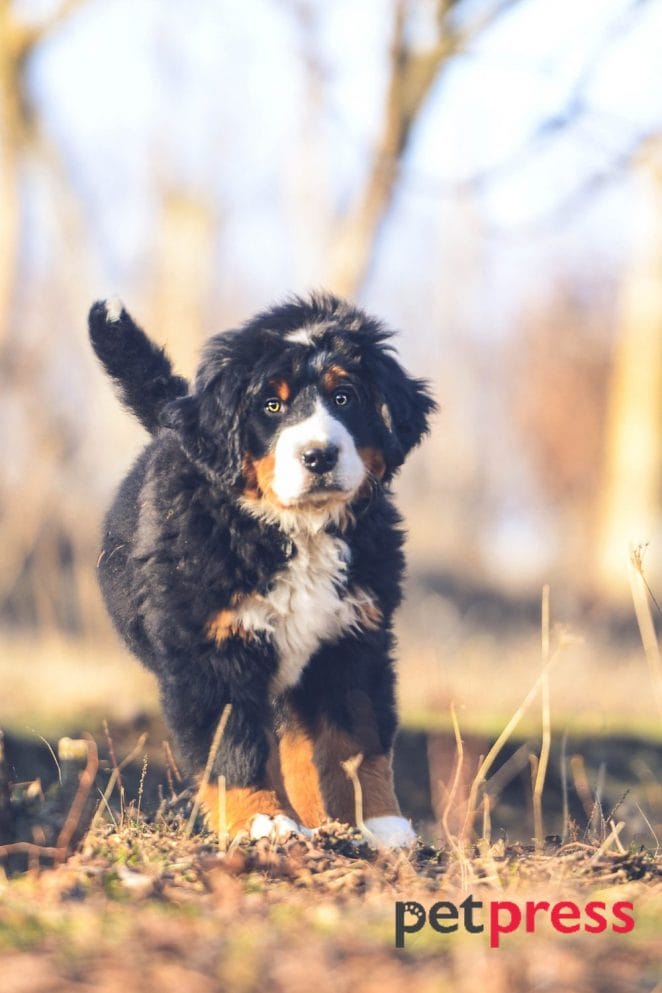
Consult with a Veterinarian
As experts in animal health, they can provide you with advice tailored to your pet’s age, health condition, and specific needs.
For instance, puppies and senior dogs have different physical limitations and may require modified exercise routines compared to adult Berners. Likewise, a Berner with a specific health condition may need specialized advice on what type of exercises to avoid or focus on more.
Joint Health
Bernese Mountain Dogs, like many large breed dogs, are prone to certain genetic health issues. Notably, they have a higher risk of developing hip and elbow dysplasia, conditions that affect the joints and can cause discomfort or even pain during exercise.
To minimize the impact on their joints, consider exercises that are gentle yet effective. Swimming, for instance, is an excellent low-impact exercise that works out the entire body without putting stress on the joints. It can be a great option, especially for Berners already showing signs of dysplasia.
Walking on softer surfaces like grass or sandy beaches can also help to minimize the strain on their joints compared to walking on hard surfaces like concrete pavements.
Always remember to warm up your Berner before starting any exercise, and cool down afterward to prevent injury to the joints.
Heat Sensitivity
Bernese Mountain Dogs have a thick, long double coat which allows them to comfortably thrive in cold weather. However, it also makes them sensitive to heat.
Berners can be prone to overheating, making it essential to adjust their exercise routine accordingly. Schedule exercise sessions for early morning or later evening when temperatures are cooler.
Ensure that Berner has access to plenty of fresh water before, during, and after exercise. Keep an eye out for signs of overheating such as excessive panting, drooling, and lethargy. If your Berner shows any of these symptoms, stop the exercise immediately and help them cool down.
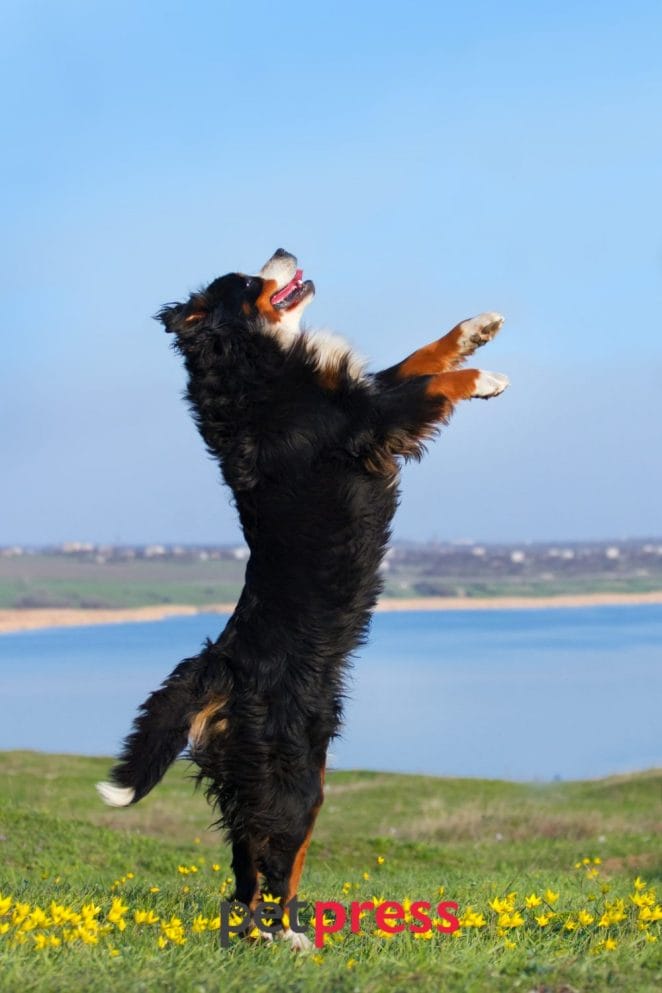
Every Bernese Mountain Dog is unique and possesses individual health considerations that must be taken into account when planning an exercise routine. Regular consultation with a vet, paying attention to joint health, and other above-mentioned steps are crucial in ensuring a safe and effective exercise routine.
Remember, exercise should enhance your Berner’s life, not endanger it. So be attentive, be vigilant, and most importantly, have fun!
Conclusion
A healthy Bernese Mountain Dog is not just about regular vet visits but also about a consistent exercise routine. Remember, exercise shouldn’t be a chore but a fun activity for you and your Berner.
By spreading awareness, we can help Bernese Mountain Dogs around the world lead a healthier, happier life.
If you’re the proud owner of a Berner, why not share a photo of your four-legged friend getting their daily exercise on social media? Be sure to use the hashtag #FitBerners!
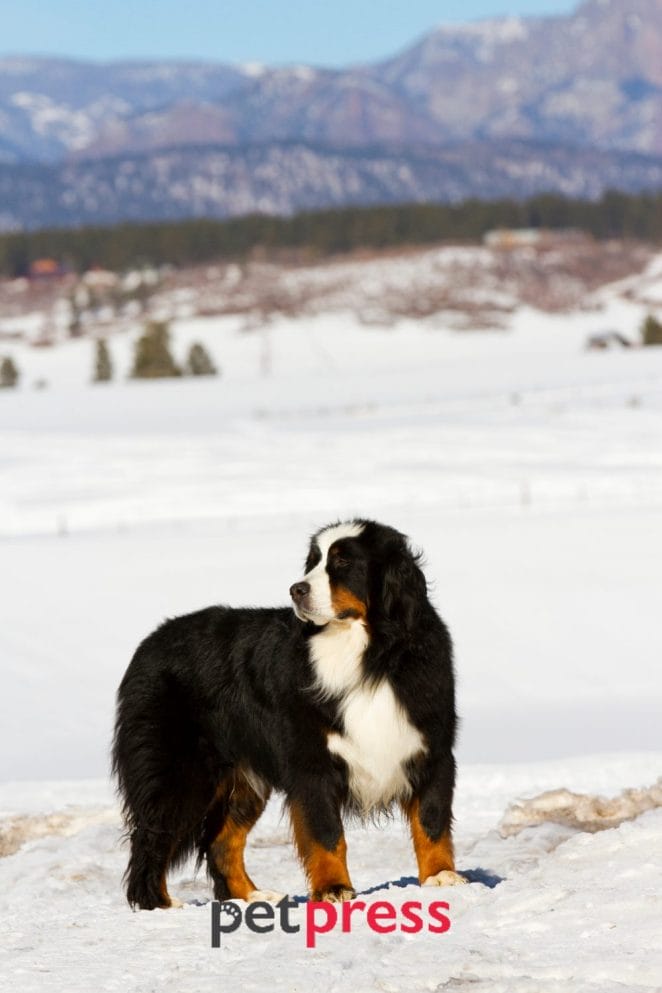
FAQs: Bernese Mountain Dog Exercise
Adult Bernese Mountain Dogs require at least an hour of exercise daily. Two sessions of an hour each would be more beneficial. However, remember to adapt this based on your dog’s age, health, and personal preferences.
Bernese Mountain Dogs are friendly and easy to train, making them suitable for first-time owners. However, their large size and exercise requirements might pose a challenge. Prospective owners should be prepared for the responsibilities that come with owning a larger breed of dog.
The lifespan of a Bernese Mountain Dog is relatively short, usually ranging from 6-8 years. However, with good genetics, proper care, regular vet check-ups, a balanced diet, and plenty of exercise, some Berners might live into their early teens.
Berners should be fed a balanced, high-quality diet suitable for large breeds. Puppies usually require smaller, more frequent meals while adults can be fed two meals per day. Always consult with your vet for specific dietary needs.
No, Bernese Mountain Dogs are not considered hypoallergenic. They have a dense double coat that sheds moderately year-round and more heavily during shedding season. They may not be the best choice for people with severe allergies.
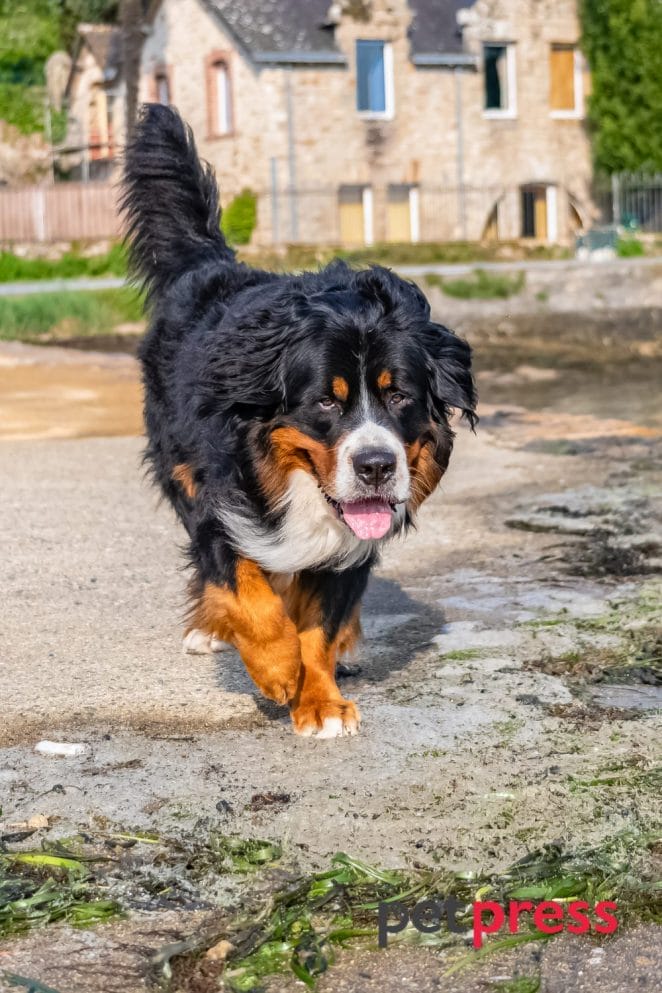
Enjoy reading? We’ve got some more interesting articles here!
8 Proven Techniques on How to Stop Howling Dogs at Night
Growing Old Together: The Top 10 Best Large Dogs for Seniors
Senior Dog Peeing in House: Finding a Humane Solution


GIPHY App Key not set. Please check settings